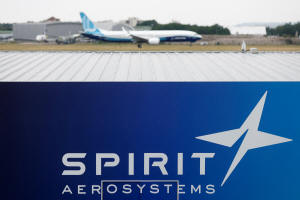With U.S. labor tight, union workers make bolder contract demands
 Send a link to a friend
Send a link to a friend
 [June 23, 2023] By
Lisa Baertlein and Bianca Flowers [June 23, 2023] By
Lisa Baertlein and Bianca Flowers
(Reuters) - Workers at aerospace supplier Spirit AeroSystems were the
latest U.S. union employees to reject a contract their leaders
negotiated with their employer, joining freight railroad employees,
airline pilots and others who are growing more fed up with stagnant pay,
high healthcare costs, scanty sick time and uncertain scheduling.
In the past two years, Spirit employees, pilots at American and United
airlines, factory workers at farm and construction equipment makers CNH
Industrial and Deere & Co and freight rail laborers have all rebuffed
deals despite pay raises that in some contracts appeared significant.
Union workers missed out on a frenzy of wage increases by employers
desperate for workers during the height of the COVID-19 pandemic. U.S.
government data shows that in the first quarter of 2021, labor
shortfalls helped push wages for nonunion private sector workers higher
than those of their union-represented counterparts.
That pay gap has shrunk as the worker shortage helped unions offset
inflation and benefit from record corporate profits, KPMG chief
economist Diane Swonk said.
"You're going to see catch-up in many of those contracts," she said.

Inflation has soared 18% from May 2019, according to the Conference
Board, a business think tank. Low unemployment makes it easier for union
workers to stand firm during negotiations.
"If it was harder to get a job, they might feel otherwise," Conference
Board senior economist Erin McLaughlin said.
Union workers also want more affordable healthcare, paid sick time and
more-flexible scheduling for greater work-life balance.
"We aren't going to settle for an economic package that doesn't
recognize the heroic efforts and personal sacrifices" of U.S. West Coast
dockworkers, union leader Willie Adams said this month ahead of reaching
a new deal.
Those longshore workers will vote in coming months on a proposed
contract that includes a 32% pay increase over six years and a one-time
"hero" bonus.
DEAL BREAKERS: MEDICAL COSTS, SICK DAYS
Late Wednesday, about 6,000 workers represented by the International
Association of Machinists and Aerospace Workers (IAM) in Wichita,
Kansas, rejected Spirit AeroSystem's offer that included a compounded
average pay increase of up to 34% through general wages increases,
cost-of-living adjustments and a guaranteed annual bonus.
Some workers said the base wage increase was insufficient and balked at
higher out-of-pocket medical costs.
There are cautionary tales even with finalized deals. For instance, some
Caterpillar workers were not happy with a deal that they ratified in
March.
Sam Johnson, 43, a machinist at Caterpillar's plant in Decatur,
Illinois, voiced frustration that his union did not fight harder to
bolster pay and shelter members from healthcare cost increases in the
deal. "Even with the pay increase, I'm pretty much still in the same
position that I was when I was making less money due to inflation," said
Johnson, adding that nonunion machinists in his area can make almost $8
per hour more than his new hourly wage of $27.55.
[to top of second column] |

A Boeing 737 MAX-10 lands over the
Spirit AeroSystems logo during a flying display at the 54th
International Paris Air Show at Le Bourget Airport near Paris,
France, June 22, 2023. REUTERS/Benoit Tessier

Late last year, U.S. freight railroad workers rejected a five-year
contract that included a 24% wage increase, citing lack of paid sick
leave. Workers were angry after the deal was imposed by Congress and
President Joe Biden. Unions later reached separate sick-pay
agreements.
Union workers at CNH Industrial factories in Wisconsin and Iowa in
January ended a nearly nine-month strike in return for wage
increases of up to 38% over four years. That deal was sweetened
after workers rejected the initial three-year deal.
In 2021, Deere workers in the Midwest rejected two contract offers
before ratifying a deal to end a five-week strike.
"As long as the economy is chugging along — we're going to likely
see these kinds of rejections," said Todd Vachon, Rutgers assistant
professor of labor studies.
SEEKING HEFTY RAISE
Record employer profits strengthened West Coast dockworkers'
position at the bargaining table. Other unions have taken note. Some
340,000 United Parcel Service workers represented by the
International Brotherhood of Teamsters want a healthy raise. The
union also aims to use the new contract terms to recruit members,
including at Amazon.com warehouses.
Another major contract negotiation set to begin is that of the
United Auto Workers with the Detroit automakers, General Motors,
Ford and Stellantis. That union has cited record profits as well.
In-demand airline pilots are leaning on labor scarcity as a
bargaining chip.
FedEx cargo pilots in July will vote on a tentative deal to give
them a 30% raise as well as a 30% increase to their legacy pension.
American Airlines pilots rejected a company offer last year, and
last month reached a deal to increase the value of their contract by
about $8 billion.

Pilots at United, working without a new contract since 2019,
overwhelmingly rejected a tentative contract last year. They are
pressing for higher pay than what Delta provided in its new pilot
contract and similar improvements in work-life balance. "The
company's profitability certainly gives room for them to address
pilot concerns," said Garth Thompson, head of United Airlines' pilot
union. "The pilot marketplace has become more competitive. That has
given us some leverage."
(Reporting by Lisa Baertlein in Los Angeles and Bianca Flowers in
Chicago; additional reporting by Rajesh Kumar Singh in Chicago;
Editing by David Gregorio)
[© 2023 Thomson Reuters. All rights
reserved.]
This material may not be published,
broadcast, rewritten or redistributed.
Thompson Reuters is solely responsible for this content.
 |